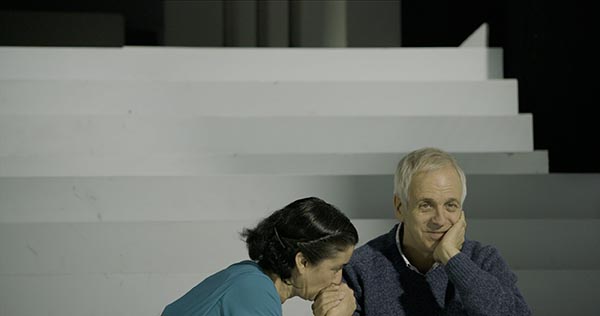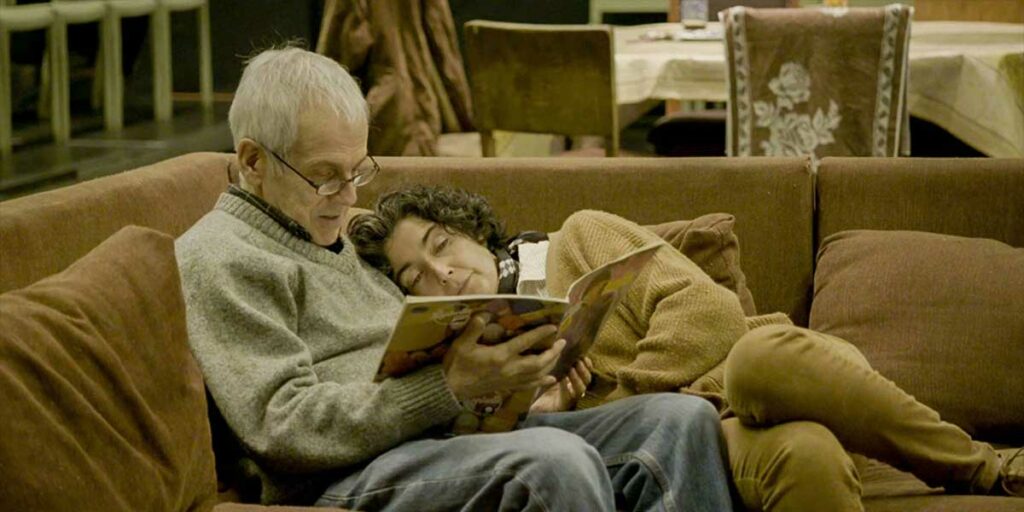The Eternal Memory is a moving portrait of the pain of Alzheimer’s Disease, but it desperately needed more context and depth.
Early on in The Eternal Memory (La Memoria Infinita), its subject, former journalist and writer Augusto Góngora, asks the eternal question: “What are we doing here?” It’s a question none of us can answer, but the answer is particularly elusive for Augusto, as he is slowly succumbing to the ravages of Alzheimer’s disease. The pain of the illness lies in watching a person that used to be so intelligent and eloquent be reduced to a place of shocking vulnerability and dependence. Through the eyes of his wife Pauli, and via the camera of Chilean director Maite Alberdi, we get an undeniably moving portrait of life and love in the shadow of illness, even though The Eternal Memory ironically ends up quite immemorable.
The tragedy of The Eternal Memory is established early on, as we get a glimpse of who Augusto and Pauli were once upon a time. We see a young Augusto, resplendent in dark hair and moustache, reporting on poverty and social issues in the later years of Pinochet’s Chile. Throughout this time, Paulina ‘Pauli’ Urrutia was a successful actress in film and telenovelas. Her simultaneous political activism saw her appointed as Minister for Culture in the Bachelet government in 2006. As we watch Pauli be sworn into office, the pair’s accomplishments are underlined. They achieved much, while simultaneously building a home and raising Augusto’s children from a previous marriage. It’s a bittersweet time, full of love, but we know what is coming.
One of the many ironies of early onset Alzheimer’s is that the person can be aware they have the disease. Seeing Augusto talk about his disease with Pauli is a frank, refreshing moment; he hates that he can’t remember some things, but at least he knows why. Then again, when Pauli has to remind them of the details of one of their first dates, it’s sad to see what he will inevitably lose. The Eternal Memory’s main point is to highlight the tragedy of degenerative mental illness; you can go from doing important work with important people (We see footage of Augusto talking with the likes of Javier Bardem and Raul Ruiz), to not knowing your own home or what day of the week it is.

However, for all its good intentions, The Eternal Memory is a one-trick pony. Besides Augusto’s illness, little else gets explored in the film’s brief 84 minutes. Any non-Chilean audience may wish to have found out more about his and Pauli’s work and activism, if only to add some additional context. The background information is mostly piecemeal, and mostly just skims the surface of the couple’s life. A news report here, a holiday there, but there’s not much depth to it all. A longer runtime might have allowed Alberdi to explore these people before illness took over. Alas, by the end of The Eternal Memory, the illness comes to define them. This is exactly what a portrait of people suffering in this way shouldn’t do.
The Eternal Memory is unquestionably moving, and it fulfils its purpose of presenting Alzheimer’s Disease upfront. Witnessing a sufferer of this wretched illness cry out for their children and friends at night, not realising the woman trying to comfort him is his wife, is a brutal but honest reality check. Yet, by not adequately explaining who this man is, and offering greater context to his suffering, the effort falls short.
The Eternal Memory (La Memoria Infinita) was screened at the 2023 BFI London Film Festival on 5-6 October. The film will be released in UK cinemas on 10 November, 2023. Read our list of 25 movies to watch at the 2023 London Film Festival!

